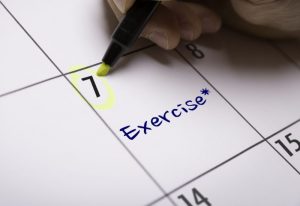A new study conducted by a team of researchers from Skidmore College, Arizona State University and California State University provided further insight into how the time of day can impact the outcome of exercise. Published in Frontiers in Physiology, a peer reviewed journal, this new study confirms prior research indicating that exercise timing can influence the outcome of that exercise. The new research also revealed that the best time to exercise for men and women may differ.
While the study was small, the results were intriguing, suggesting important areas for future research that may prove valuable for maximizing the health and well-being benefits of exercise.
Time of Day Impacts Exercise Outcome
 As researchers have already established, the time of day that one exercises has an impact on the results of that exercise. That is, in part, due to the role of the circadian rhythm in helping to regulate the timing of countless processes within the body, including metabolic or energy-related processes.
As researchers have already established, the time of day that one exercises has an impact on the results of that exercise. That is, in part, due to the role of the circadian rhythm in helping to regulate the timing of countless processes within the body, including metabolic or energy-related processes.
These processes run according to the basic schedule we humans have kept for the vast majority of our history: being active during the day and resting at night. Our bodies, right down to our individual cells, are performing different tasks at different parts of the day. Thus, exercising in the morning can have a different impact than exercising in the evening.
Morning exercise, for example, tends to promote more fat burning than evening exercise. That difference relates to differences in what is going on in the body at those particular times. Glycogen levels are low in the morning because the supply of glycogen – the stored glucose from carbohydrates – is depleted through the night to keep your body running while you sleep. With little glycogen to use for fuel, your body burns fat to fuel your activities. Later in the day, when your metabolism slows down and you’ve rebuilt your glycogen levels through carbohydrate consumption, you’ll burn through glucose before you start burning fat.
While the circadian rhythm can impact the effects of exercise at different times of the day, exercise can also impact circadian rhythm health. The circadian rhythm is affected by a number of external and environmental cues. Light is the most powerful cue, but physical activity or exercise and meal timing also have a significant degree of influence on circadian rhythm health. Exercise can be a valuable tool in maintaining or even resetting your circadian rhythm.
Differences in Best Time to Exercise for Men and Women
The new study confirmed the conclusions of other researchers in earlier studies regarding the increased fat burning benefit of morning exercise. This small study lasted 12 weeks and included 26 men and 30 women, all of whom were healthy, non-smoking, athletically inclined and maintained a lean, healthy body weight. The study participants were split into two groups, with one group exercising in the morning from 6:00 a.m. to 8:00 a.m. and the other in the evening, from 6:30 p.m. to 8:30 p.m. The researchers weren’t specifically seeking differences between men and women in this study, however some notable differences did emerge.
For women, morning exercise yielded greater fat burning, including abdominal fat, an increase in the power of lower body muscles and lower blood pressure. The women exercising in the evening experienced greater upper body strength benefits, better hunger control and better mood, including reduced depression and feeling less tension and stress.
Time of day didn’t seem to matter much for men when it came to improving their physical performance, with both day and evening exercise groups showing similar improvements. Men exercising in the evening did experience greater benefits relating to metabolic health and heart health. They also experienced higher energy, feeling less tired overall. Interestingly, the men reported more of a beneficial impact on mood than did the women, according to the researchers. That held true for both morning and evening exercising males, with both groups reporting decreased levels of anger, depression and overall tension.
Targeted Timing Can Help You Achieve Exercise Goals

When it comes to enjoying the benefits of evening exercise, depending on your individual chronotype – when you prefer to be active and when you prefer to sleep – you may have to experiment a bit to find a time that doesn’t interfere with your sleep timing. For some people, exercising too close to bedtime can make it harder to fall asleep at the usual time. Always discuss any major changes to your physical activity levels with your health care provider, especially if you already face health challenges.







